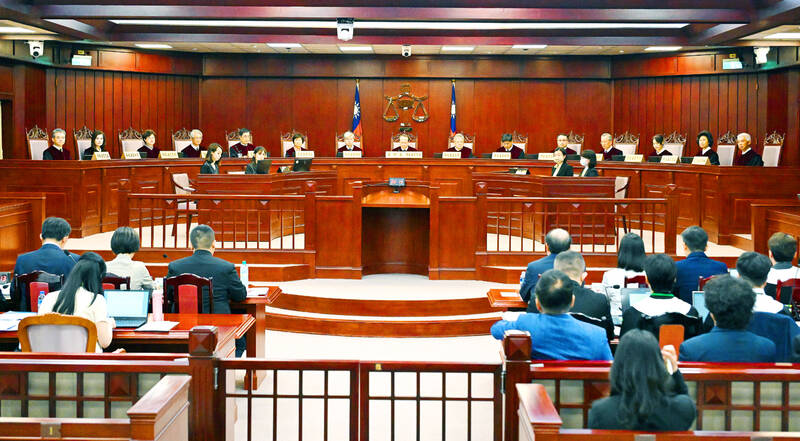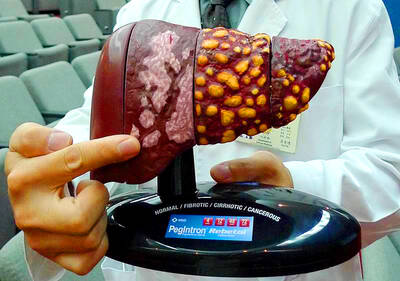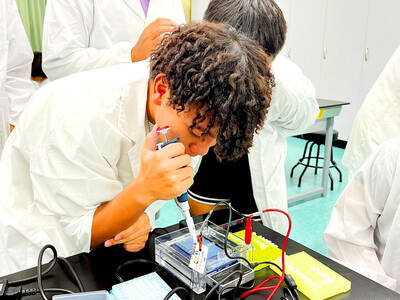The Constitutional Court is on Aug. 6 to hear oral arguments on executive oversight amendments passed by opposition Chinese Nationalist Party (KMT) and Taiwan People’s Party (TPP) lawmakers and opposed by the ruling Democratic Progressive Party (DPP).
After the amendments became law on June 26, separate requests for a judicial ruling were filed by President William Lai (賴清德) as well as the Executive Yuan, the Control Yuan and the DPP’s legislative caucus.
Before ruling on the amendments’ constitutionality, the court would consider whether to approve an injunction blocking their enforcement. Attorneys and legal academics representing the DPP-affiliated petitioners, and surrogates selected by the KMT and TPP caucuses presented competing arguments at a preparatory hearing on the matter yesterday.

Photo: Liao Chen-huei, Taipei Times
Q1: What would be the main disputes in the Constitutional Court’s review of the case?
The court is tasked with determining whether the deliberation that led up to the amendments’ passage contained “palpable” and “sufficient” defects, as defined by the 1994 ruling on the legislative process of the Organic Act of the National Security Council (國安會組織法, Interpretation No. 342).
The Constitutional Court will also rule on whether the updated laws approved by the legislature on May 28 contravene the Constitution.
The revisions give the legislature new investigative powers, including the power to hold hearings, with public officials subject to fines and jail time if they refuse to attend hearings or provide information, or if they present false information.
The amendments also include provisions requiring the president to deliver an annual “state of the nation” address at the legislature and then field questions from the floor.
Q2: Why have different agencies petitioned the Constitutional Court?
In a rarity, the three top government agencies, all headed by DPP officials, have joined the party’s legislative caucus in seeking a judicial ruling.
Lyu Jheng-yan (呂政諺), head of the Judicial Reform Foundation’s Law and Policy Department, said it was mainly because the four parties were affected by different provisions in the amendments, and they hence petitioned the court separately based on their needs.
For example, the Control Yuan would contend the measures granting the Legislative Yuan extra powers would usurp its constitutionally bestowed investigative powers, he said.
Soochow University Department of Political Science academic Su Tzu-chiao (蘇子喬) said that the overlapping legal filings, which he described as “a barrage of arrows,” reflected the DPP’s intent to bolster its arguments that there were “serious violations of the Constitution.”
Q3: Is it constitutional for the Cabinet to take legal action after the legislature voted on June 21 to uphold the amendments sent for reconsideration?
Some, including KMT Chairman Eric Chu (朱立倫), have questioned the Cabinet’s decision, arguing that Premier Cho Jung-tai (卓榮泰) “should immediately accept” the amendments following the June 21 vote, as per the Additional Articles of the Constitution.
However, Cabinet spokesman Chen Shih-kai (陳世凱) on June 27 told a news briefing that requesting the legislature’s reconsideration of the bills and seeking a constitutional ruling on the amendments were “two different constitutional procedures.”
The Cabinet had attempted to stop the amendments’ implementation by asking the legislature to vote on them once again, but the opposition lawmakers, who together hold a majority of seats, voted down the request on June 21.
According to the procedure, Lai signed the bills into law on June 24.
Lyu holds the same view as the Cabinet spokesman, adding that the executive body had petitioned with Article 47 of the Constitutional Court Procedure Act (憲法訴訟法) serving as its legal basis.
However, such a move by the Cabinet is unprecedented.
The Constitutional Court has only intervened twice to resolve disputes between the Cabinet and the legislature over laws passed by the latter, following lawmakers’ rejection of the Cabinet’s request for reconsideration of those laws.
These two instances were brought about by the passage of the Referendum Act (公民投票法) in 2003 and that of a special act to form a task force to investigate the assassination attempt on then-president Chen Shui-bian (陳水扁) of the DPP on March 19, 2004.
In both cases, it was the DPP legislative caucus that moved forward to seek a ruling on the constitutionality of the laws passed by a hung legislature.
Q4: How long would the Constitutional Court take to reach a ruling and would it be final?
The court should make a ruling within three months after the conclusion of oral arguments, but this deadline can be pushed back by two months if necessary, the Constitutional Court Procedure Act (憲法訴訟法) states.
For the amendments to be annulled, the case must be reviewed and approved in a majority decision by at least two-thirds of sitting justices.
Lyu said that justices might expedite the review of the disputes, given their “highly contentious” nature.
In the case of the Legislative Yuan’s initiative to probe the assassination attempt on Chen Shui-bian, a ruling (Interpretation No. 585) was handed down three months after the DPP legislative caucus filed its petition, Lu said.
In another case, which concerned mandatory fingerprinting for issuing ID cards, an injunction was granted 10 days after the court received the DPP caucus’ application, with a ruling (Interpretation No. 603) rendered approximately four months later, he said.
Su said justices would rule on the oversight laws case in about three months.
The 2000 case about ceasing the construction of the Fourth Nuclear Power Plant in Gongliao District (貢寮), New Taipei City, took the court less than three months to reach a ruling (Interpretation No. 520), Su added.
Moreover, Lu said justices were more likely than not to strive to resolve the disputes before Oct. 31, when seven of them would step down after serving for eight years, to “ensure the stability of the constitutional system.”
Otherwise, the case is likely to drag on in the event the opposition-dominated legislature refuses to confirm seven new justices nominated by Lai, Lu said.
If the DPP is determined to reject the amendments, it can still mobilize the public to petition for national referendums — regardless of the Constitutional Court’s decision, Su added.
Q5: Who would be hearing the case and what are their backgrounds?
Barring any recusals, the 15 incumbent justices, all of whom were appointed by former president Tsai Ing-wen (蔡英文) of the DPP, would preside over the case.
The Constitutional Court on Tuesday rejected KMT Legislator Weng Hsiao-ling’s (翁曉玲) requests that justices Hsu Tzong-li (許宗力), who is also president of the Judicial Yuan, and Hsu Chih-hsiung (許志雄) recuse themselves from the case.
Weng pointed to Hsu Tzong-li’s involvement in a 2004 case on the scope of legislative authority (Interpretation No. 585), arguing that he had opposed granting the legislature investigative powers.
Weng also said that Hsu Chih-hsiung had previously held senior positions in the DPP government, including serving as minister without portfolio in Chen Shui-bian’s administration.
However, the court in its decision — which was made without the participation of Hsu Tzong-li and Hsu Chih-hsiung — said that Weng did not provide sufficient evidence to establish “reasonable grounds for believing” that the two justices would be unable to perform their duties impartially.

The Taipei Summer Festival is to begin tomorrow at Dadaocheng Wharf (大稻埕), featuring four themed firework shows and five live music performances throughout the month, the Taipei Department of Information and Tourism said today. The festival in the city’s Datong District (大同) is to run until Aug. 30, holding firework displays on Wednesdays and the final Saturday of the event. The first show is scheduled for tomorrow, followed by Aug. 13, 20 and 30. To celebrate the 30th anniversary of Disney Pixar's movie Toy Story, the festival has partnered with Walt Disney Co (Taiwan) to host a special themed area on

BE CAREFUL: The virus rarely causes severe illness or death, but newborns, older people and those with medical conditions are at risk of more severe illness As more than 7,000 cases of chikungunya fever have been reported in China’s Guangdong Province this year, including 2,892 new cases last week, the Centers for Disease Control (CDC) yesterday said it is monitoring the situation and considering raising the travel notice level, which might be announced today. The CDC issued a level 1 travel notice, or “watch,” for Guangdong Province on July 22, citing an outbreak in Foshan, a manufacturing hub in the south of the province, that was reported early last month. Between July 27 and Saturday, the province reported 2,892 new cases of chikungunya, reaching a total of 7,716

STAY VIGILANT: People should reduce the risk of chronic liver inflammation by avoiding excessive alcohol consumption, smoking and eating pickled foods, the physician said A doctor last week urged people to look for five key warning signs of acute liver failure after popular producer-turned-entertainer Shen Yu-lin (沈玉琳) was reportedly admitted to an intensive care unit for fulminant hepatitis. Fulminant hepatitis is the rapid and massive death of liver cells, impairing the organ’s detoxification, metabolic, protein synthesis and bile production functions, which if left untreated has a mortality rate as high as 80 percent, according to the Web site of Advancing Clinical Treatment of Liver Disease, an international organization focused on liver disease prevention and treatment. People with hepatitis B or C are at higher risk of

FINE PRINT: Parents should carefully evaluate offers from cram schools that are designed to lower the amount they have to refund later, a New Taipei City official said New Taipei City Consumer Protection Office Director Wang Chih-yu (王治宇) urged parents to check contract content and institutional operations before sending children to cram schools, enrichment classes or day care centers during summer vacation. Closures and refund problems most commonly occur in cram schools, especially language cram schools, many of which have been facing difficulties due to the popularity of online learning apps and studying abroad, Wang said. Cram schools that closed due to financial issues were often unable to refund tuition fees, he said. Under Article 24 of the Rules for the Establishment and Management of Short-term Supplementary Learning Centers (短期補習班設立及管理準則), cram